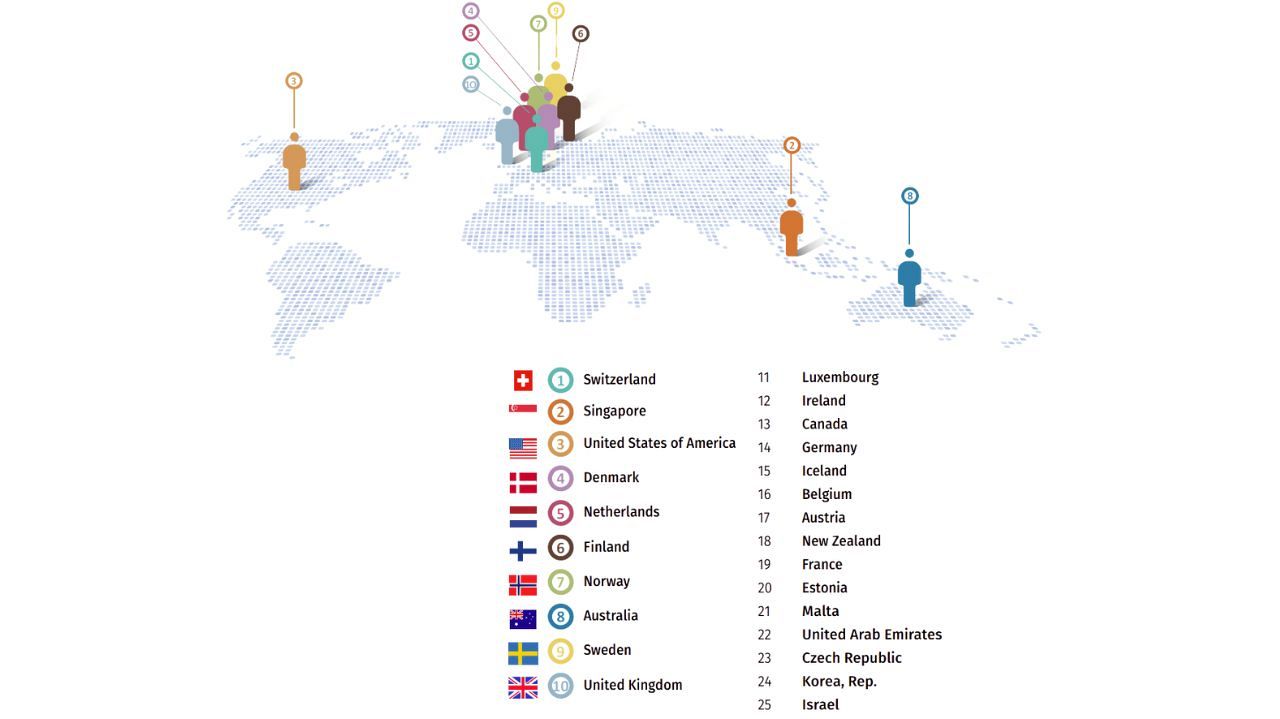Which countries attract more talent? European regions dominate the top 25

Which countries attract and retain more talent, and how will the talent acquisition landscape change in the next 10 years? Euronews Business takes a look.
Switzerland, Singapore, and the United States are in prominent positions in attracting and nurturing talent, according to the Global Talent Competitiveness Index (GTCI) 2023.
The top 10 also feature Denmark, the Netherlands, Finland, Norway, Australia, Sweden, and the United Kingdom, with 17 European countries in the top 25.
Some of the European countries sliding down in the ranking significantly over the last decade are the United Kingdom, Luxembourg, and Iceland, while Australia and Norway have shown strong improvement.
GTCI is published annually by French non-profit graduate business school INSEAD, in collaboration with Geneva-based consultancy Descartes Institute for the Future and the Human Capital Leadership Institute.
The GTCI features 134 countries across the world.
While the top positions have remained steady over the past decade, Doris Sohmen-Pao, chief executive officer of the Human Capital Leadership Institute, highlighted rapid changes in talent acquisition practices.
"While there has been minimal movement in the rankings over the past 10 years, there have been rapid changes in talent management across industries. This is especially so within companies as they respond to technological transformations, the pandemic, as well as the drive for sustainability," said Sohmen-Pao.
Several emerging economies have significantly improved their talent competitiveness, with China and Russia attracting more talent than ever and scooping the 40th and 52nd rankings, respectively.
What are some countries doing better than others to attract talent?
The strong association between talent competitiveness and income level could be one of the most important factors, just as better performers in the index show more stability in their talent competitiveness over time.
Switzerland has been sitting at the top of the list over the last decade, not least due to the hefty salary one can hope for should they move to the country, but also thanks to the stable political and socioeconomic backdrop. The country has been consistently strong in all the aspects examined by the index, such as enabling and retaining talent.
Switzerland also ranks first in sustainability due to its high levels of social protection and the quality of its natural environment, GTCI found.
Singapore earns high rankings for its formal education, good employability, and innovative economy. INSEAD also gave a good score for the city-state's receptiveness to international business and talent.
The US claimed back to its third place again after losing it last year. The prime spot was granted due to its world-class universities and support for lifelong learning. The US was also highly ranked for high labour productivity.
Across the globe, the greatest improvers in attracting talent over the last ten years are Albania, Indonesia, and Azerbaijan, jumping by 16, 14, and 13 positions, respectively.
How will talent competitiveness evolve over the next 10 years?
According to the study, talent competition will grow fiercer.
While uncertainties and global tensions are going to continue to escalate across trade, investment, politics, and diplomacy, talent competitiveness is expected to become increasingly crucial for nations, leading to a growing number of 'talent wars'.
The landscape of work will continue to evolve, influenced by better quality of life expectations of younger generations, emerging economic models, and advancements in technologies such as AI.
Cities and regions will take the lead in crafting innovative talent strategies, emphasising quality of life and sustainability, to establish themselves as hubs for talent.
Meanwhile, regulatory policies will be crucial to prevent tensions and harness human and technological potential for a more sustainable world.
"Talent competition will be one of the pillars of the next age of globalization. Our collective ability to make the world less unequal, and the planet more sustainable will depend heavily on our capacity to grow, attract and nurture the right talents," noted Bruno Lanvin, co-author of the report.
Meanwhile, a new life habit is emerging: in the rapidly moving and uncertain economic environment, re-skilling is going to be more important than ever according to the study.
後話
China is ranked 40, where is Hong Kong? Anyway, Hong Kong is not a country as part of China.




没有评论:
发表评论